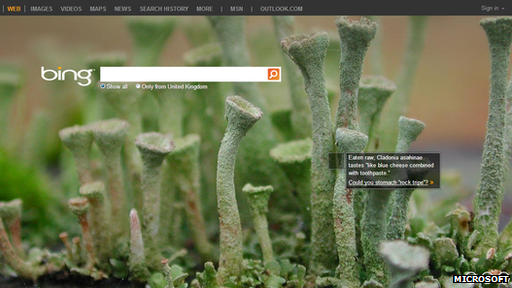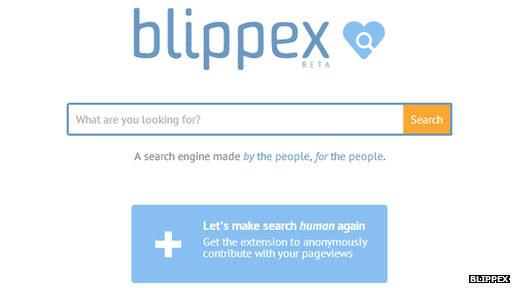Google: alternatives to the search giant
Google is constantly working on innovations and improvements to its services. Only in the past few weeks, the company has added the ability to automatically correct images when uploading to Google+, launched a network of balloons to provide Internet access in places with poor infrastructure, opened access to a new music subscription service, and updated the map service.
But while the company reports on the latest revenues and achievements, investors are interested in only one thing - revenue indicators from the contextual advertising of the company
Among all Google innovations, the search service remains one of the most reliable sources of the company's income.
In June, more than 90% of searches on computers and more than 92% of searches on mobile devices in the UK came from Google. Any company can envy these numbers. At the same time, in the US market, the average percentage is below average and is about 78%. There are problems in the markets of China, Russia and South Korea.
For a long time, the Google search service has remained the best of its kind. The company has invested a lot of money in the implementation of search services and in its mobile platform, thereby securing leadership in the near future.
Today it’s hard to imagine who can make serious competition to Google, except for the services of Russia and the countries of Asia, which put serious efforts into search engines and systems.
But even in this situation, other companies make attempts to create a competitive product, offer different search capabilities, or even try to use completely different principles for building and operating a search engine.

Microsoft's Bing search engine is Google’s leading competitor when it comes to the search market as a whole. But at the same time, the share of Bing is less than a twentieth of all search queries.
The most noticeable difference from Google is the use by Bing of colorful photographs as the background of the start page. Of course, this is only a visual difference and nothing more.
Microsoft is experimenting with social features. In addition to the search results, Bing users in the USA have access to an additional panel that offers their Facebook friends, who in turn can possibly provide more information or help with the search.
Bing is also working on a “boards” service that will allow users to independently create “highly specialized content” for search results.

The most popular Russian search engine. Now the company is working on introducing a new approach to displaying search results under the name “islands”, in which the answers are interactive blocks, which in turn are designed to eliminate the need to switch to external resources.
Thus, the user will be able to solve the problem right on the search page. For example, the search for “Aeroflot Registration Moscow” will show in the results a form in which the user will enter their details and send directly to the airline.

DuckDuckGo highlights privacy as a key feature, promising not to collect or use the personal information of its users.
This problem became relevant after the discovery of the fact that Google, Microsoft and others sent data about users to the US National Security Agency. DuckDuckGo also does not sin with the volume of advertising and does not personalize search results.

Most search engines base their ranking of results on content analysis and on the links between pages.
The Blippex search engine organizes the results based on their DwellRank - the amount of time users spent on the page from the moment they got to it. The more time they spent on the page, the more important information is considered.
The service obtains the necessary information by installing an extension by users that anonymously sends activity information.
Blippex was launched last week and the first users sometimes report unexpected results, but the developers promise that the more users use the service, the better the results.

Wolfram Alpha does not position itself as a search engine, but as a knowledge base and a set of computational algorithms. Although many users still use the service to search for external information.
Instead of providing links to other sites, the service collects facts and figures from various sources and then uses this data to display search results in the form of tables, graphs, and other illustrations.
WolframAlpha provides an advanced paid set of services that allows users to process their own data and promises a wider analysis of information

A characteristic feature of Blekko is the use of “slash tags” - a tool for filtering the result that the user wants to get. If, for example, a user wants to find out where to buy a cake, then he will often enter “cake / store / restaurant”, but if he wants to see articles on the topic of cake, he will enter “cake / blog”. The results are grouped into different categories, such as purchases, recipes, jewelry - in order to help the user focus on the most suitable type of desired result

A leading South Korean search engine was created in 1999 by a group of former Samsung employees.
Requests produce unusually long lists of links grouped by type of source - blogs, social networks, programs, books, news.
Often the links lead the user to Naver’s personal materials including “cafes” - communities where users share interesting content on a specific topic.

Pipl specializes in finding details about a particular person or his materials online. The service involves the use of queries built on the name, postal address, phone number.
Service developers claim that their system finds information that competitors miss because Pipl searches for information in social network profiles, court protocols, member lists, and other databases.
The results include photographs and sometimes the names of other people that the person you
are looking for knows. Often the service is used to search for your own profiles and publications, which the author forgot about over time.

Baidu is China's most popular search engine. The company claims that the service provides not only links, but often, exactly the relevant information that the user is looking for. This can include music and video, and even interactive applications on the pages you are looking for.
For a long time, the service was available only in Chinese, and only recently have the developers launched the English version.

Yacy is built on the principle of a peer-to-peer network. Instead of using his own servers for indexing sites, he assigns this task to the computers of his users using special software.
The collected information is distributed over a common distributed database. Since the search takes place on users' computers, Yacy claims that the results are not censored.
Unfortunately, the algorithms for ranking service results are not as advanced as those of other competitors.
Source bbc.co.uk
But while the company reports on the latest revenues and achievements, investors are interested in only one thing - revenue indicators from the contextual advertising of the company
Among all Google innovations, the search service remains one of the most reliable sources of the company's income.
In June, more than 90% of searches on computers and more than 92% of searches on mobile devices in the UK came from Google. Any company can envy these numbers. At the same time, in the US market, the average percentage is below average and is about 78%. There are problems in the markets of China, Russia and South Korea.
For a long time, the Google search service has remained the best of its kind. The company has invested a lot of money in the implementation of search services and in its mobile platform, thereby securing leadership in the near future.
Today it’s hard to imagine who can make serious competition to Google, except for the services of Russia and the countries of Asia, which put serious efforts into search engines and systems.
But even in this situation, other companies make attempts to create a competitive product, offer different search capabilities, or even try to use completely different principles for building and operating a search engine.
Bing

Microsoft's Bing search engine is Google’s leading competitor when it comes to the search market as a whole. But at the same time, the share of Bing is less than a twentieth of all search queries.
The most noticeable difference from Google is the use by Bing of colorful photographs as the background of the start page. Of course, this is only a visual difference and nothing more.
Microsoft is experimenting with social features. In addition to the search results, Bing users in the USA have access to an additional panel that offers their Facebook friends, who in turn can possibly provide more information or help with the search.
Bing is also working on a “boards” service that will allow users to independently create “highly specialized content” for search results.
Yandex

The most popular Russian search engine. Now the company is working on introducing a new approach to displaying search results under the name “islands”, in which the answers are interactive blocks, which in turn are designed to eliminate the need to switch to external resources.
Thus, the user will be able to solve the problem right on the search page. For example, the search for “Aeroflot Registration Moscow” will show in the results a form in which the user will enter their details and send directly to the airline.
Duckucko go

DuckDuckGo highlights privacy as a key feature, promising not to collect or use the personal information of its users.
This problem became relevant after the discovery of the fact that Google, Microsoft and others sent data about users to the US National Security Agency. DuckDuckGo also does not sin with the volume of advertising and does not personalize search results.
Blippex

Most search engines base their ranking of results on content analysis and on the links between pages.
The Blippex search engine organizes the results based on their DwellRank - the amount of time users spent on the page from the moment they got to it. The more time they spent on the page, the more important information is considered.
The service obtains the necessary information by installing an extension by users that anonymously sends activity information.
Blippex was launched last week and the first users sometimes report unexpected results, but the developers promise that the more users use the service, the better the results.
Wolfram alpha

Wolfram Alpha does not position itself as a search engine, but as a knowledge base and a set of computational algorithms. Although many users still use the service to search for external information.
Instead of providing links to other sites, the service collects facts and figures from various sources and then uses this data to display search results in the form of tables, graphs, and other illustrations.
WolframAlpha provides an advanced paid set of services that allows users to process their own data and promises a wider analysis of information
Blekko

A characteristic feature of Blekko is the use of “slash tags” - a tool for filtering the result that the user wants to get. If, for example, a user wants to find out where to buy a cake, then he will often enter “cake / store / restaurant”, but if he wants to see articles on the topic of cake, he will enter “cake / blog”. The results are grouped into different categories, such as purchases, recipes, jewelry - in order to help the user focus on the most suitable type of desired result
Naver

A leading South Korean search engine was created in 1999 by a group of former Samsung employees.
Requests produce unusually long lists of links grouped by type of source - blogs, social networks, programs, books, news.
Often the links lead the user to Naver’s personal materials including “cafes” - communities where users share interesting content on a specific topic.
Pipl

Pipl specializes in finding details about a particular person or his materials online. The service involves the use of queries built on the name, postal address, phone number.
Service developers claim that their system finds information that competitors miss because Pipl searches for information in social network profiles, court protocols, member lists, and other databases.
The results include photographs and sometimes the names of other people that the person you
are looking for knows. Often the service is used to search for your own profiles and publications, which the author forgot about over time.
Baidu

Baidu is China's most popular search engine. The company claims that the service provides not only links, but often, exactly the relevant information that the user is looking for. This can include music and video, and even interactive applications on the pages you are looking for.
For a long time, the service was available only in Chinese, and only recently have the developers launched the English version.
Yacy

Yacy is built on the principle of a peer-to-peer network. Instead of using his own servers for indexing sites, he assigns this task to the computers of his users using special software.
The collected information is distributed over a common distributed database. Since the search takes place on users' computers, Yacy claims that the results are not censored.
Unfortunately, the algorithms for ranking service results are not as advanced as those of other competitors.
Source bbc.co.uk
